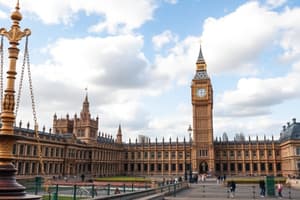Podcast
Questions and Answers
What percentage of criminal cases are dealt with in magistrates' courts?
What percentage of criminal cases are dealt with in magistrates' courts?
- 95% (correct)
- 75%
- 100%
- 50%
A claimant in a civil court must always be an individual.
A claimant in a civil court must always be an individual.
False (B)
What is the primary role of judges in a crown court?
What is the primary role of judges in a crown court?
To oversee the case.
Defendants convicted by magistrates can appeal to the _____ court.
Defendants convicted by magistrates can appeal to the _____ court.
Match the following roles with their responsibilities:
Match the following roles with their responsibilities:
What is the highest court in the criminal and civil law system?
What is the highest court in the criminal and civil law system?
Magistrates are usually legally trained professionals.
Magistrates are usually legally trained professionals.
What can the prosecution do regarding an acquittal by magistrates?
What can the prosecution do regarding an acquittal by magistrates?
The majority decision from the Supreme Court becomes _____.
The majority decision from the Supreme Court becomes _____.
Which of the following types of offenses are dealt with in the crown court?
Which of the following types of offenses are dealt with in the crown court?
Which of the following is NOT a main source of law in the UK?
Which of the following is NOT a main source of law in the UK?
Criminal law considers an offence against an individual rather than the community.
Criminal law considers an offence against an individual rather than the community.
What is the primary role of statutes in UK law?
What is the primary role of statutes in UK law?
In a criminal case, the prosecution must prove the defendant is guilty beyond a __________.
In a criminal case, the prosecution must prove the defendant is guilty beyond a __________.
Match the following cases to their relevant legal system:
Match the following cases to their relevant legal system:
What determines the outcome in civil law cases?
What determines the outcome in civil law cases?
The ECHR is a part of the EU laws that the UK is still subject to after Brexit.
The ECHR is a part of the EU laws that the UK is still subject to after Brexit.
What is the penalty typically imposed in civil cases?
What is the penalty typically imposed in civil cases?
A defendant in a criminal court can either plead __________ or not guilty.
A defendant in a criminal court can either plead __________ or not guilty.
Which article of the ECHR guarantees the right to a private life?
Which article of the ECHR guarantees the right to a private life?
Flashcards
Statutes and Statutory Instruments
Statutes and Statutory Instruments
Laws created by Parliament, involving processes like passing through the House of Commons and House of Lords.
Customs (Common Law)
Customs (Common Law)
Legal rules and principles established by courts through their decisions over many years, dating back to the Middle Ages.
Precedents (Case Law)
Precedents (Case Law)
Recorded court decisions that clarify the law and set precedents for future cases. Lower courts must follow higher court decisions.
European Convention on Human Rights (ECHR)
European Convention on Human Rights (ECHR)
Signup and view all the flashcards
Criminal Law
Criminal Law
Signup and view all the flashcards
Civil Law
Civil Law
Signup and view all the flashcards
Defendant (Criminal Court)
Defendant (Criminal Court)
Signup and view all the flashcards
Claimant (Civil Court)
Claimant (Civil Court)
Signup and view all the flashcards
Acquitted
Acquitted
Signup and view all the flashcards
Convicted
Convicted
Signup and view all the flashcards
Civil Court
Civil Court
Signup and view all the flashcards
Claimant
Claimant
Signup and view all the flashcards
Defendant
Defendant
Signup and view all the flashcards
Admit or Deny Liability
Admit or Deny Liability
Signup and view all the flashcards
Criminal Court
Criminal Court
Signup and view all the flashcards
Magistrates Court
Magistrates Court
Signup and view all the flashcards
Crown Court
Crown Court
Signup and view all the flashcards
Supreme Court
Supreme Court
Signup and view all the flashcards
High Court
High Court
Signup and view all the flashcards
County Court
County Court
Signup and view all the flashcards
Study Notes
Main Sources of Law in the UK
- Statutes and statutory instruments: Laws made by Parliament, going through the House of Commons.
- Customs (common law): Laws derived from court decisions dating back to the middle ages. Known as judge-made law.
- Precedent (case law): Recorded judicial decisions clarifying legal principles, setting precedents. Lower courts are bound by decisions of higher courts.
- European Convention on Human Rights (ECHR): A treaty the UK has signed, which became part of UK law (Human Rights Act). EU laws no longer apply directly.
Divisions of Law
- Criminal law: Offences against the community prosecuted by the state. Serious crimes are heard in crown court, less serious in magistrates court
- Civil law: Disputes between individuals or companies, where compensation may be sought. Cases are heard in county or high courts.
Criminal Courts - Magistrates court
- Handles 95% of criminal cases with offences like low-level theft, drink driving.
- Magistrates are lay people, not legally trained.
- Can impose up to 12 months imprisonment.
Criminal Courts - Crown Court
- Deals with the most serious offences, including murder, rape, and fraud.
- Appeals can be made to the Court of Appeal, then the Supreme Court.
Civil Courts
- Civil law cases involving companies or individuals suing for damages, like medical negligence.
- Mostly heard in county courts and the high courts.
- Examples of disputes: Torts, copyright, family law.
Trials and Appeals
- Trials can be conducted by a jury.
- Judges oversee cases in high court, circuit, and recorder courts.
- Appeals from lower courts are heard by higher courts (court of appeal then supreme court).
- The Supreme Court: Highest court in civil and criminal law in the UK. Hearings are restricted to high-profile cases.
Studying That Suits You
Use AI to generate personalized quizzes and flashcards to suit your learning preferences.
Related Documents
Description
Explore the fundamental sources of law in the UK, including statutes, customs, and precedents. This quiz covers the distinctions between criminal and civil law, as well as the functions of magistrate and crown courts. Test your knowledge on the legal principles that shape the UK's judicial system.




